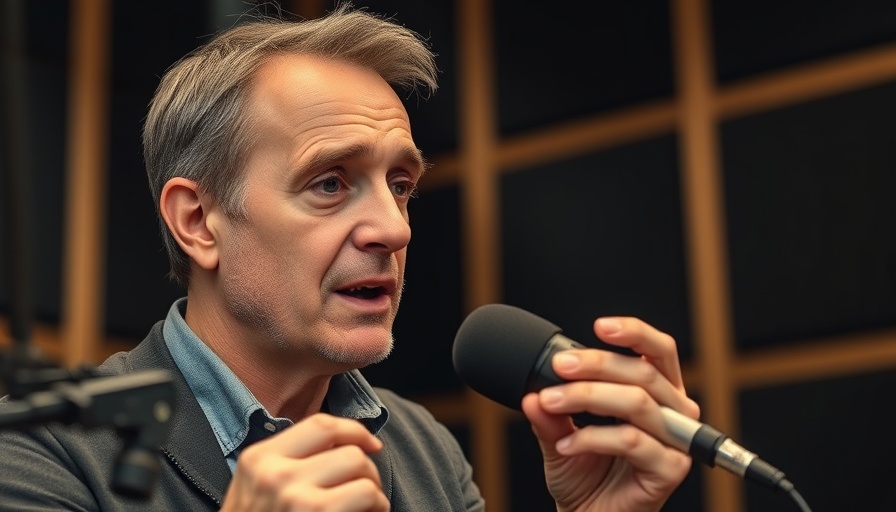
Understanding Our Movement Struggles
In today’s fast-paced world, the struggle to exercise is as common as the understanding that we should do so. The video titled "The Real Reasons We Struggle To Exercise & How To Fix It TODAY" featuring experts Katy Bowman and Diana Hill brings to light various cognitive and systemic barriers that inhibit our movement. The conversation dives deep into mental and physical inertia caused by our environments, societal expectations, and deeply ingrained psychological perspectives.
In 'The Real Reasons We Struggle To Exercise & How To Fix It TODAY,' the discussion dives into the psychological barriers that prevent movement, prompting us to analyze our own barriers to exercise.
Redefining Exercise: Beyond the Gym
The first insight revolves around our understanding of exercise itself. Traditionally, exercise has been boxed into the confines of gym sessions and high-energy workouts. However, both Bowman and Hill emphasize that this rigid mindset limits our engagement with movement. As Diana Hill points out, many people are tied to outdated paradigms about what constitutes effective exercise. Instead of viewing movement solely as a designated gym time, we should consider the fluidity of everyday life, embracing walking, playful activities, or simply stretching as valid forms of exercise.
The Emotional Burden of Movement
Bowman and Hill also uncover the emotional context surrounding our relationship with movement. Shame, past experiences, and momentary insecurities often act as significant barriers. The lingering memory of negative past experiences associated with physical activities can be daunting, compelling many to avoid movement entirely. This brings forth the significance of psychological flexibility, which emphasizes adapting and evolving rather than sticking stubbornly to pre-defined notions of movement.
Time Constraints: The Illusion of Busy Schedules
One pressing concern they address is the perception of time. Many struggle with the belief that they simply don't have enough time to exercise amidst family and work commitments. Hill aptly introduces the concept of ‘time affluence,’ which allows individuals to appreciate moments that feel rich and fulfilling, even in small doses. By identifying values beyond just physical fitness—like connecting with family or enhancing mental well-being—individuals can derive meaningful experiences from their activities. For instance, walking your child to school can seamlessly integrate movement into a daily responsibility without feeling like a chore.
Breaking the Cycle of Inflexibility
So how do we shift this narrative around exercise? The conversation suggests employing actionable insights, such as 'stacking' tasks where movement becomes part of other responsibilities, like playing with children or doing chores. Hill encourages readers to embrace flexibility in their routines, challenging themselves to step outside conventional boundaries where a lack of time or resources can often hinder movement. This is about changing not just the choices made but also the environments we inhabit—from physical spaces to mental constructs.
Creating a Supportive Environment for Movement
Notably, the video touches on the significance of creating arenas that support movement while normalizing everyday physicality. This involves both the physical spaces around us and our mental attitudes toward movement. In homes, cluttered areas can disrupt the flow of activity; however, arranging environments to invite movement can have powerful effects. Whether sculpting a common space into a playful area or simply pushing past the embarrassment of enjoying physical activities may also breathe new life into our engagement with exercise.
Understanding Technology's Role
An interesting aspect of the video revolves around technology's dual role—as a tool for connection but also as a major distraction. While people scroll through countless feeds on their devices, they may unconsciously choose a sedentary lifestyle over engaging in physical activity. Diana Hill recommends “urge surfing”—a technique for recognizing cravings without acting on them. This can teach individuals to understand their patterns of engagement with technology, thereby encouraging them to swap screen time with physical movement.
Common Misconceptions: Structure versus Freedom in Exercise
Lastly, the discussion debunks a prevalent myth about the rigidity of exercise. Many assume that structured exercise, like attending the gym, is the only method for achieving fitness. However, redefining movement to include fun activities, leisure walks, and interactions with others can significantly bolster both physical and mental health. Building community around movement—through friends and shared activities—fosters an atmosphere where exercise is a joy rather than an obligation.
Conclusion: Empowering Ourselves to Move Forward
By embracing these insights, we can challenge the ingrained reasons why many of us find it hard to exercise. Whether it’s rethinking our values, understanding the importance of our environment, or using technology wisely, we have the tools to overcome barriers and integrate movement into our daily lives effectively. The pursuit isn’t just about the act of exercise; it’s about fostering a lifelong relationship with movement that nurtures our minds and bodies alike. And that begins today—allowing ourselves to redefine what movement means while slowly leaning into its benefits.
If you are ready to shift your mindset around exercise and reclaim your relationship with movement, consider grabbing a copy of the insightful discussion encapsulated in Panellists' work, which addresses these topics extensively.
 Add Row
Add Row  Add
Add 




Write A Comment